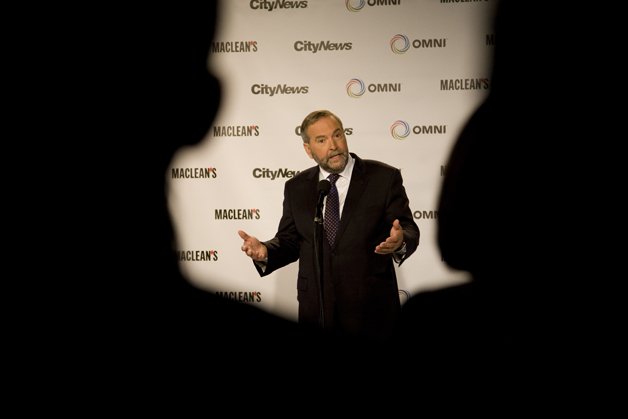
It has an air of desperation about it. And a touch of remorse. But it is severely lacking in political transparency.
For New Democrats who consider electoral prospects paramount, Tom Mulcair’s personal reflections on the 2015 campaign released on the party’s website February 10 lead inexorably to the one conclusion. He must be replaced as party leader.
The status of the much-vaunted Interim Report of the Campaign Review Working Group, chaired by party president Rebecca Blaikie, remains in the shadows. Why wasn’t it attached to Mulcair’s plaintive cry for redemption? How can the party rank-and-file properly appreciate the “insights” of the review so far if they are not made public?
According to Blaikie, her working group’s summary will go to the incoming federal executive and council. So much for the promises from on-high to improve communication and decision-making.
Mulcair talks about core social democratic values in his letter. It might be good to make a list of these. Sadly, Mulcair does not. “We came up short,” Mulcair writes. That admission puts him in the worldwide derby for understatement of the decade.
Mulcair says he takes “full responsibility [for the campaign’s] shortcomings,” but the failures evidenced were not primarily due to what he calls faults of “preparation and execution.” The campaign content was dead wrong, and the super-centralized enforcement of its pro-capitalist message was decisively fatal.
Lapses? Cautiousness? Were those really the problems that impeded the campaign or was it the vision itself?
In his open letter, Mulcair asserts “our commitment to balancing the budget overshadowed our social democratic economic vision which saw new government revenues generated through higher taxes for corporations, closing CEO tax loopholes and a crackdown on tax havens.”
No, it was not a matter of overshadowing. It was a case of contradiction. The commitment to balancing the budget, with only tiny moves on the revenue side, was a prescription for soft austerity, not unlike what social democratic parties have offered in Europe – and which is why many of them have been superseded by populist forces of the left and right.
While socialism is increasingly the watchword in Britain and the U.S., Mulcair is trying to re-warm the leftover soup of the 2015 campaign, regurgitating the vague goal of “a fairer, more progressive Canada.”
“Respect between the party and caucus, and specifically respectful dialogue, will make us stronger,” he writes.
Now this looks like an opportunity for frankness. Exactly how was this respect lacking? And what about respect owed by the leader for adopted policy, for example, on the plight of Palestinians in Gaza or the West Bank?
We’re told “The campaign lacked an over-arching narrative that could easily communicate our progressive proposals.” The truth is that the campaign theme was plainly reactionary: a balanced budget, incentives to big business, and a foreign policy to match. Canadians wanted a sharp break with the hated Harper regime. Instead of a LEAP Manifesto forward, the NDP brass offered a cautious, awkward stagger.
Newly-appointed officials in the leader’s suite – party veteran Raymond Guardia as chief-of-staff and Jordan Leichnitz as his deputy – won’t make a difference if they are cut from the same cloth as their predecessors, no matter how super enthusiastic they may be.
What’s really needed is enforced adherence to the policy decided by the party membership.
Barry Weisleder is chair of the NDP Socialist Caucus.
nowtoronto.com | @nowtoronto












